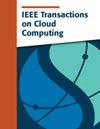ARM 云服务器是否已为数据库工作负载做好准备?实验研究
IF 5
2区 计算机科学
Q1 COMPUTER SCIENCE, INFORMATION SYSTEMS
引用次数: 0
摘要
几乎所有主要的云计算提供商都提供在配备 64 位 ARM CPU 的服务器上运行的虚拟机。例如,亚马逊网络服务(AWS)设计了基于 ARM 的定制 CPU,命名为 Graviton2 和 Graviton3。其他云提供商,如微软 Azure 和谷歌云平台(GCP),则采用了配备 Ampere Altra CPU 的服务器。在此背景下,我们进行了一项全面的实验研究,涵盖内存键值存储、关系数据库、企业区块链和机器学习推理。我们涵盖了所有可用的 ARM 云处理器类型,包括 Graviton2(AWS)、Graviton3(AWS)、Ampere Altra(Azure 和 GCP)、倚天 710(阿里巴巴云)和鲲鹏 920(华为云)。我们的分析表明,倚天和 Graviton3 是英特尔至强 CPU 服务器的有力竞争者,在内存工作负载方面取得了相似或更好的结果。然而,在基于 ARM 的服务器上,OLAP、ML 推理和区块链的性能却低于至强。原因主要有三个方面:1)软件未优化;2)时钟频率较低;3)内核级性能较低。令人惊讶的是,与 Xeon 服务器相比,ARM 服务器在 Linux 内核系统调用上花费的时间多出 2 倍。不过,基于 ARM 的服务器显示出巨大的潜力。鉴于其较低的云计算价格,ARM 服务器可能是性能要求不高时的理想选择。本文章由计算机程序翻译,如有差异,请以英文原文为准。
Are ARM Cloud Servers Ready for Database Workloads? an Experimental Study
Almost all major cloud providers offer virtual machines running on servers with 64-bit ARM CPUs. For example, Amazon Web Services (AWS) designed custom ARM-based CPUs named Graviton2 and Graviton3. Other cloud providers, such as Microsoft Azure and Google Cloud Platform (GCP), employ servers with Ampere Altra CPUs. In this context, we conduct a comprehensive experimental study covering in-memory key-value stores, relational databases, enterprise blockchains, and Machine Learning inference. We cover all the available types of ARM cloud processors, including Graviton2 (AWS), Graviton3 (AWS), Ampere Altra (Azure and GCP), Yitian 710 (Alibaba Cloud), and Kunpeng 920 (Huawei Cloud). Our analysis shows that Yitian and Graviton3 are serious competitors for servers with Intel Xeon CPUs, achieving similar or better results with in-memory workloads. However, the performance of OLAP, ML inference, and blockchain on ARM-based servers is below that of Xeon. The reasons are mainly threefold 1) un-optimized software, 2) lower clock frequency, and 3) lower performance at core level. Surprisingly, ARM servers spend 2X more time in Linux kernel system calls compared to Xeon servers. Nonetheless, ARM-based servers show great potential. Given their lower cloud computing price, ARM servers could be the ideal choice when the performance is not critical.
求助全文
通过发布文献求助,成功后即可免费获取论文全文。
去求助
来源期刊

IEEE Transactions on Cloud Computing
Computer Science-Software
CiteScore
9.40
自引率
6.20%
发文量
167
期刊介绍:
The IEEE Transactions on Cloud Computing (TCC) is dedicated to the multidisciplinary field of cloud computing. It is committed to the publication of articles that present innovative research ideas, application results, and case studies in cloud computing, focusing on key technical issues related to theory, algorithms, systems, applications, and performance.
 求助内容:
求助内容: 应助结果提醒方式:
应助结果提醒方式:


